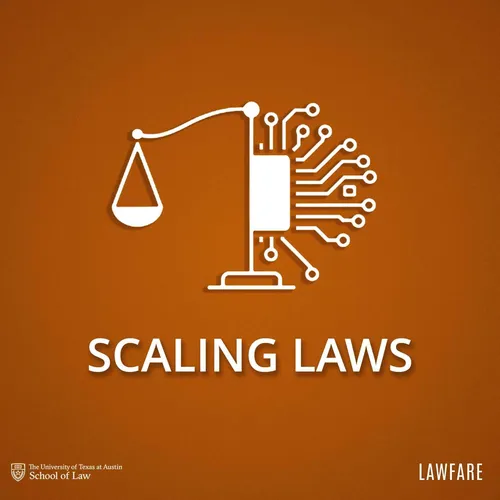
Scaling Laws
Hosted on Acast. See acast.com/privacy for more information.
- Update frequency
- every 4 days
- Average duration
- 52 minutes
- Episodes
- 173
- Years Active
- 2022 - 2025

TRAILER: SCALING LAWS

Matt Perault, Ramya Krishnan, and Alan Rozenshtein Talk About the TikTok Divestment and Ban Bill
Last week the House of Representatives overwhelmingly passed a bill that would require ByteDance, the Chinese company that owns the popular social media app TikTok, to divest its ownership in the pla…

Jawboning at the Supreme Court
Today, we’re bringing you an episode of Arbiters of Truth, our series on the information ecosystem.
On March 18, the Supreme Court heard oral arguments in Murthy v. Missouri, concerning the potential …

How Are the TikTok Bans Holding Up in Court?
In May 2023, Montana passed a new law that would ban the use of TikTok within the state starting on January 1, 2024. But as of today, TikTok is still legal in the state of Montana—thanks to a prelimi…

Jeff Horwitz on Broken Code and Reporting on Facebook
In 2021, the Wall Street Journal published a monster scoop: a series of articles about Facebook’s inner workings, which showed that employees within the famously secretive company had raised alarms a…

Will Generative AI Reshape Elections?
Unless you’ve been living under a rock, you’ve probably heard a great deal over the last year about generative AI and how it’s going to reshape various aspects of our society. That includes elections…

The Crisis Facing Efforts to Counter Election Disinformation
Over the course of the last two presidential elections, efforts by social media platforms and independent researchers to prevent falsehoods from spreading about election integrity have become increas…

Talking AI with Data and Society’s Janet Haven
Today, we’re bringing you an episode of Arbiters of Truth, our series on the information ecosystem. And we’re discussing the hot topic of the moment: artificial intelligence. There are a lot of less-…

What Impact did Facebook Have on the 2020 Elections?
How much influence do social media platforms have on American politics and society? It’s a tough question for researchers to answer—not just because it’s so big, but also because platforms rarely if …

Brian Fishman on Violent Extremism and Platform Liability
Earlier this year, Brian Fishman published a fantastic paper with Brookings thinking through how technology platforms grapple with terrorism and extremism, and how any reform to Section 230 must allo…

Cox and Wyden on Section 230 and Generative AI
Generative AI products have been tearing up the headlines recently. Among the many issues these products raise is whether or not their outputs are protected by Section 230, the foundational statute t…

An Interview with Meta’s Chief Privacy Officers
In 2018, news broke that Facebook had allowed third-party developers—including the controversial data analytics firm Cambridge Analytica—to obtain large quantities of user data in ways that users pro…

Eugene Volokh on AI Libel
If someone lies about you, you can usually sue them for defamation. But what if that someone is ChatGPT? Already in Australia, the mayor of a town outside Melbourne has threatened to sue OpenAI becau…

A TikTok Ban and the First Amendment
Over the past few years, TikTok has become a uniquely polarizing social media platform. On the one hand, millions of users, especially those in their teens and twenties, love the app. On the other ha…

Ravi Iyer on How to Improve Technology Through Design
On the latest episode of Arbiters of Truth, Lawfare's series on the information ecosystem, Quinta Jurecic and Alan Rozenshtein spoke with Ravi Iyer, the Managing Director of the Psychology of Technol…

Does Section 230 Protect ChatGPT?
During recent oral arguments in Gonzalez v. Google, a Supreme Court case concerning the scope of liability protections for internet platforms, Justice Neil Gorsuch asked a thought-provoking question.…

ChatGPT Tells All
You've likely heard of ChatGPT, the chatbot from OpenAI. But you’ve likely never heard an interview with ChatGPT, much less an interview in which ChatGPT reflects on its own impact on the information…

When States Make Tech Policy
Tech policy reform occupies a strange place in Washington, D.C. Everyone seems to agree that the government should change how it regulates the technology industry, on issues from content moderation t…

Rick Hasen and Nate Persily on Replatforming Trump on Social Media
On November 19, Twitter’s new owner Elon Musk announced that he would be reinstating former President Donald Trump’s account on the platform—though so far, Trump hasn’t taken Musk up on the offer, pr…

A Member of Meta’s Oversight Board Discusses the Board’s New Decision
When Facebook whistleblower Frances Haugen shared a trove of internal company documents to the Wall Street Journal in 2021, some of the most dramatic revelations concerned the company’s use of a so-c…